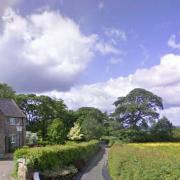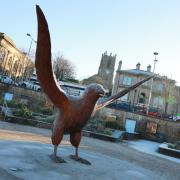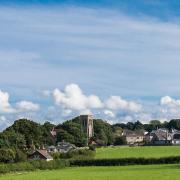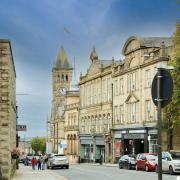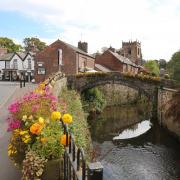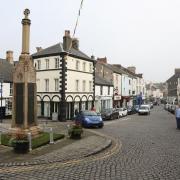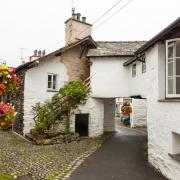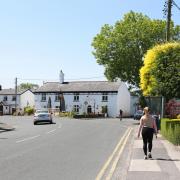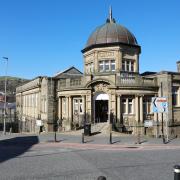The rich soil from the marshes helped this traditional Lancashire community to develop into an attractive place to live and work. Mike Smith reports
ONCE upon a time, Tarleton was an island in the Lancashire marshes. In 1557, the Duchy Court of Lancaster was told that villagers were often prevented from going to their parish church, located just two miles away in Croston, by 'the rising of the great waters and rivers.'
When I asked Suzanne Watson of Dunscar Garden Centre if this description was something of an overstatement, she showed me a surprisingly intact piece of bog oak, which has led one expert to suggest that the great waters might have resulted from a tsunami!
For a short time, Tarleton was provided with its own place of worship, but then spent almost a century without one until St Mary's Church was constructed in 1717. Built in redbrick, with a later stone tower, it is preserved by the Churches' Conservation Trust, but only used for services on the fourth Sunday in August because, by the late 19th century, the villagers had decided that even this church was inconveniently situated - and too small. To satisfy them, Holy Trinity Church was erected in the middle of the village.
When the marshes were drained, they left behind rich soil that supports the growth of fruit, vegetables and flowers in abundance.
As a result, Tarleton is surrounded by a sea of garden centres, notably Tarleton Specimen Plants and Dunscar, which was founded in 1948 by retired policeman Frank Vickers.
He was succeeded by his son, Eric, a former headmaster of the local primary school. The present managing director is Eric's daughter, Hilary Lewis.
A three-year expansion programme will include a physical merger with the Garden Caf� and Gift Shop, set up by Hilary's husband, Shaun, a former Chinese interpreter. Managed by Elaine Lee, it enjoys ready access to local produce and has won a North West Fine Foods Award.
Award-winning is a way of life at another family concern, Tarleton Specimen Plants, which has received no fewer than 45 gold medals at flower shows. As well as providing a widely used landscape design service, the firm sells garden furniture, water features and exotic plants.
This thriving business, which has the largest collection of specimen plants in Lancashire, is managed by Brian Aughton. It was founded by his grandfather and now involves his sons, Phil and Gary, and his daughter, Denise Hughes. They will be selling their Christmas trees at Samlesbury Hall.
In Mark Square, at the heart of Tarleton, I discovered two more successful family businesses. Crme de la Crme delicatessen, which occupies two large units and has its own brand of 300 condiments, is managed by Andrew Lund. It was founded by his mother, who took the firm's name from a Parisian dance troupe that was visiting Bacup.
Mee's Bakery was founded by Bill and Barbara Mee after they had been made redundant on the closure of Forshaw's Bakery. With the help of other redundant workers, they built up a respected business that involves many family members, including their grand-daughter Paige Whiteside.
Margaret Summerfield, who works in the library at the entrance to Mark Square, told me about proposals to build lots of additional retail and residential units in the square.
While recognising that the old village of Tarleton is expanding into a popular residential town, she hopes, like everyone else I met, that any development will preserve the character of Mark Square, which won a design award when it was constructed in 1990. Currently, it contains Tarleton's Christmas tree.
On moving outside the square, I came across yet more family concerns. Johnson's Butchers was founded 85 years ago by Gilbert Johnson, whose grandsons, Stuart and Anthony, now manage the business along with their sister, Gillian McKeen. Some of their beef comes from Belgian Blues on their own farm, where they also keep reindeer which, Anthony joked, only work on Christmas Eve.
Webster and Sons, a high quality furnishing store, which has been dubbed the Harrods of the North, was founded in 1889 and now includes a popular restaurant in an extension dedicated to the founder, Joseph Webster. The firm passed to his son and grandson, both of whom were called Joseph, and is now managed by his great grandson, also called Joseph, who shares the running of the business with his brother Jonathan and has a son called - you guessed it - Joseph.
Wondering if there are any businesses in Tarleton that are not long-standing family firms, I visited the Boskins, a courtyard precinct on the site of a former farm and the home of the Lancashire Bridal Gallery. Although this business, which occupies a stunning oak-beamed loft, is only a year old, its bridal gowns have proved to be so popular that it has already expanded into the adjacent premises. The gallery is a dream-come-true for Pauline Stables who, in the best Tarleton tradition of keeping it in the family, has her daughter, Dawn Keijker, as her business partner.
After leaving the Boskins, I encountered Bob Tomes, who was loading into his vehicle a coffin whose surface was covered by pictures of Hurricanes and Spitfires. This turned out to be a product of Colourful Coffins, a firm that makes bespoke coffins designed to celebrate the lives and interests of the deceased. I was not surprised to hear that Colourful Coffins is yet another family firm, founded by Bob's mother.
Just as I was toying with a theory that the self-sufficiency and family cohesion that typifies island people must have somehow been passed down the centuries, I came upon a large sports field, where a group of under-13s was practising rugby under their coach, fireman Steve Mann. Their team is affiliated to Tarleton RUFC, which was founded in 1990 by two enthusiasts, Hugh Paterson and Gwyn Morgan, and now has 250 members - a remarkable success story for an island of Rugby Union in a sea of traditional football territory.



